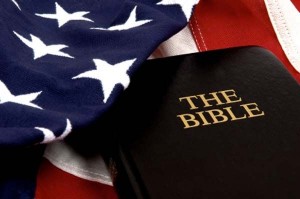In But Not Of: The Christian and the World
 The recent decision by a federal judge relative to a prayer banner in Cranston High School West has generated, as the saying goes, more heat than light. On the one hand, people’s sensibilities are offended that a revered object that has been in place for decades now has to be removed due to one person’s initiative. On the other hand, others see its very existence as a violation of the basic law of our land.
The recent decision by a federal judge relative to a prayer banner in Cranston High School West has generated, as the saying goes, more heat than light. On the one hand, people’s sensibilities are offended that a revered object that has been in place for decades now has to be removed due to one person’s initiative. On the other hand, others see its very existence as a violation of the basic law of our land.
This very same week two other cases relating to separation of church and state also made the headlines. New York City officials announced that some 160 congregations that have been paying to use public schools for Sunday worship services may no longer do so. It is interesting to note that according to a United States Supreme Court ruling religious organizations may continue to have access to public school space for activities like club meetings and religious lesson; however, worship services are now banned because they could imply government endorsement of a particular faith. This is despite the fact that the buildings are generally empty on weekends and that those worshipping are of course tax payers who support these schools. So it seems that in New York City’s public school classrooms, it’s okay to talk about God but not okay to talk to God!
The second item concerns a United States Supreme Court decision that for the first time recognizes a “ministerial exception” to employment discrimination law, saying that church and other religious groups must be free to choose and dismiss their leaders without government interference. The Obama administration, however, had argued that churches should not enjoy such protection and its employees should be treated the same as if they were employed by labor unions or social clubs.
In confronting this problem of separation of church and state, or the relationship between the sacred and the secular, I would like to offer two points for your reflection. First, we who are believers and worshipers need reminding from time to time that the world will always hate us, as it hated Christ; this was Jesus’ farewell message to us at the Last Supper. At that time He prayed not that His followers be spared persecution or suffering but only that they not fall prey to the wiles of Satan, the only one who can destroy both body and soul for eternity. The fact that we who are His disciples are in the world but of the world is reflected in Our Lord’s admonition to render unto Caesar the things that are Caesar’s, but first to render unto God the things that are God’s. Jesus Himself states the principle that there is a difference between the sacred and the secular, and that the sacred takes precedence, whether secular authorities agree or not.
As Americans, we are proud of our tradition of government of the people, by the people and for the people. The Declaration of Independence continues to inspire millions of people, and the United States Constitution is an example of democratic government to countless nations. However, as significant as these documents are, they are not equal to the teaching and the authority of the Bible which is God’s Word. At Judgment Day, we will not be asked to recite the Declaration of Independence or quote the Bill of Rights; we will be judged on whether we have put God’s Word and Law first in our lives whatever the cost or persecution we underwent to do so.
A second principle that should guide us in these controversial matters is God’s example in dealing with His children. In all three readings today we hear about men invited by God to take part in His plan to save the world. God invites the young Samuel by calling him to live the life of a prophet but Samuel must say Yes before God can entrust him with a mission. In the Gospel, Andrew and John freely follow Christ, and Jesus calls Simon, to be known as Peter, to follow Him as well. Jesus never forced, cajoled or intimidated anyone to become His disciple. And of course Saint Paul, who began life as Saul, the ardent persecutor of Christians, became the Apostle to the Gentiles because he said yes to Jesus.
We need to take renewed confidence in Our Lord’s teaching that He has overcome this world. There will be setbacks and obstacles before us as we strive to make God’s kingdom come and His will be done on earth as it is in heaven. Let us not become discouraged but draw our inspiration from and follow the example of the One who is gentle and humble of heart. We would do well to take for our inspiration the words of today’s responsorial Psalm, “Here am I, Lord; I come to do your will!”
Note: Bishop Evans’ homilies will now be regularly featured on Catholic Lane.

